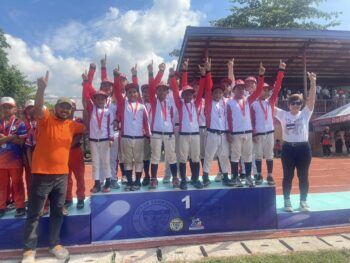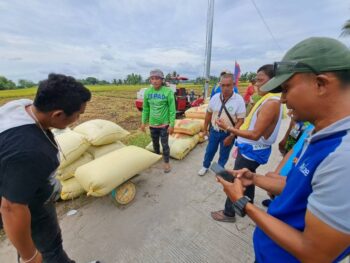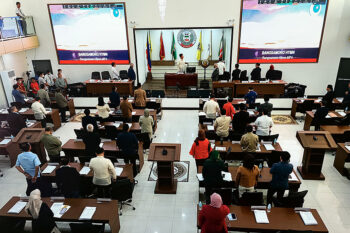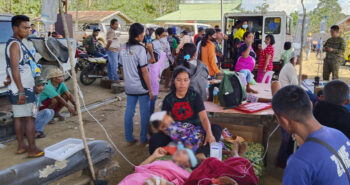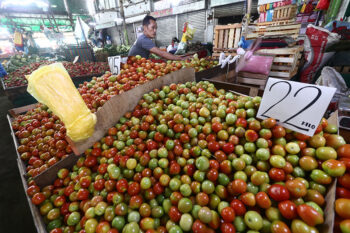DAVAO CITY (MindaNews/30 Sept) — The book cover immediately informs the reader that this is a book badly needed by the citizenry of the Republic of the Philippines during these complex times under the Duterte Presidency.
The book arrives in the Philippine literary landscape at a most crucial time when a growing number of Filipinos are expressing deep concern regarding how the State is waging a drug war and yet wants to engage in initiatives that could help bring peace to the land.
Two very important questions which demand urgent answers are asked: 1) Is President Rodrigo R. Duterte complicit in murder as his administration aggressively wages war on drugs that is seeing a large number of people getting killed in just a short span of time? 2) Is mining in Mindanao serving the common good?
The same back cover states that Fr. Riordan seizes the bull by the horns by using the criteria of the common good and confronts the controversial issues bounding the newly-installed Duterte administration. His theological and philosophical explorations provide the reader a guide in helping evaluate the three-pronged program of this administration in eradicating he drug problem, criminality, and corruption in the country.
It speaks very highly of ADDU’s Publication Office that it is able to fast-track the publication of this book at this time when many of those who are very concerned as to how the State is conducting its affairs need guidelines on how to critically view the current socio-political realm of the Republic. This is especially true as the public sphere is so muddled with the histrionics – with a lot of references to what the Philippine Daily Inquirer refers to as “sex, lies and videotape” — that now dominate public discourse. While it will be civil society organizations who might immediately be interested in securing a copy of the book, those in the State bureaucracy from Davao’s City Hall to Malacañang — including Panacañang — are challenged to find time to read this book.
The book has twelve chapters and the titles immediately provoke the interest of the reader while looking at the Table of Contents. These Chapters include topics many of which are in the form of questions: “Rethinking our challenges in terms of common goods, The common good as the complete set of conditions for fulfillment, international order as a common good, Would a Philippine federal republic better serve the common good?, Is mining in Mindanao for the common good? Is the president complicit in order? Should the politicians obey the church?”
Indeed, the discourse of common good takes on added significance to the public sphere of the body politic in these times when this government is barely in its hundred days of existence but has already provoked very strong and passionate responses on both those fully supportive of the Duterte administration’s goals and approaches and those critically against. It is easy for many of us to be frustrated – and maybe even heartbroken – at the intense fragmentation among us at a time when we should be consolidating our ranks given the major social and ecological issues we face as a nation.
As Fr. Joel E. Tabora SJ, President of ADDU wrote in his Foreword: “It is a must read for those wrestling with the challenges emerging with the determined leadership of the new Philippine President, and for those serious about achieving the common good – “the good of all and of each individual, because we are all responsible for all” (Sollicitudo rei socialis 38) – in the rich diversity of Philippine society today.”
Fr. Riordan is connected with the Heythrop College of the University of London and his principal focus in terms of his philosophical reflection has been the notion of the common good. His other books include: A grammar of the common good: Speaking of globalization (2008) and Our common good in the European Union (2016). He has been a frequent visitor to the Philippines and during his last visit to Davao was a witness to President Duterte’s first weeks in office.
He believes that “the concept of the common good is basically philosophical and thus is accessible to everyone regardless of their religious affiliation.” However, being a Catholic priest, he draws on |the resources of the Catholic worldview and engages his reader on the notions of solidarity, subsidiarity and the common good.” Such a perspective could help CSOs especially church-based groups to strengthen its stance as to the role of church and religion in facing the urgent political issues of the times which common good requires. He then reminds everyone that “we have more to do, together, in pursuit of our common good.”
Jurgen Habermas – the noted German philosopher and social theorist – believes that the agenda of the modern era has not fully taken root in our societies, despite the many years since the dawn of the Enlightenment. People everywhere have not been enlightened enough with notions of the common good, human dignity and consequently, of human rights. In this our post-modern era there is need to return to the values enshrined by Enlightenment rational principles. This can only happen if we are able to truly assert a Habermasian public sphere where the “best argument” will ultimately bring us to a consensus as to how to deal with our economic, economic, social, cultural and ecological realities.
It is up to us who care as to where our country is headed to push the parameters of this public sphere. In this difficult task, Fr. Riordan’s book serves us well.


